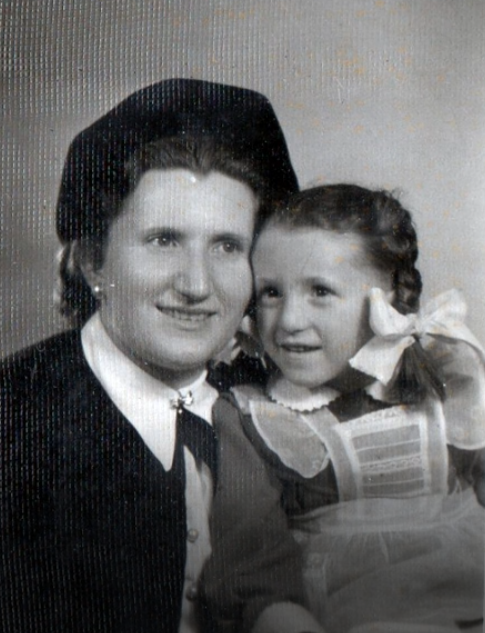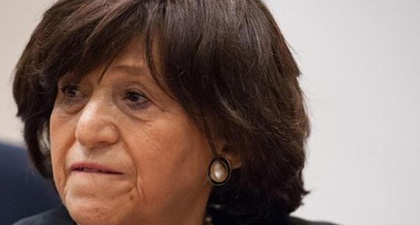On Dec. 21, 2019, Angela Orosz-Richt celebrated her 75th birthday – a milestone for anyone, but a miracle in her case.
Orosz-Richt lives in Montreal, but was born in Auschwitz-Birkenau to a Hungarian prisoner. Children born to Jewish women at the camp were killed up until November 1944, when the mass extermination of Jews was halted.
That she survived under the conditions she and her mother endured until Auschwitz’s liberation on Jan. 27, 1945, is a testament to her mother Vera Bein’s determination and heroism, Orosz-Richt said.
“I want to make sure her fight to save my life is not forgotten. In spite of giving birth to me in the worst nightmare imaginable, she never gave up.”
Orosz-Rich weighed just one kilogram at birth, which was not surprising given that her mother was half-starved and doing physical labour to the end of her pregnancy. The tiny infant was too weak to cry, but that soundlessness probably spared her life.
Almost a year later, she weighed only three kilograms and barely moved. Doctors back in Hungary did not believe she would recover.
Orosz-Rich grew to less than five feet tall, but her energy, even at 75, belies those desperate early years.
The experiments Bein underwent in Auschwitz, to which she and her husband were deported in May 1944, at the hands of Josef Mengele, left her unable to have any more children. Somehow, the growing fetus escaped the diabolic doctor’s toxic injections. The little girl was delivered in a bunk by a fellow inmate.
Unknown to Bein, her husband had already perished at the age of 32.
Orosz-Richt is today the surprisingly effervescent mother of two, grandmother of eight and great-grandmother of two. She will return to her birthplace for a ceremony commemorating the 75th anniversary of the liberation of Auschwitz on Jan. 27, an event that will be attended by numerous world leaders.

For the first 70 years of her life, Orosz-Richt, who immigrated to Canada in 1973 from Hungary, lived a very private life, as did her mother, who settled in Toronto in 1966.
Orosz-Richt was haunted by Auschwitz throughout most of her life. But that changed five years ago, when her stepbrother, Ted Bolgar, an Auschwitz survivor who’s active with the Montreal Holocaust Museum, prodded her to go to the 70th anniversary commemoration in 2015.
Her immediate reaction was “no way,” but her daughter, Kathleen Klein, eventually persuaded her.
As wrenching as that experience was, it paled next to one a few months later when she testified at the war crimes trial of former Auschwitz SS guard Oskar Groening in Germany.
A prosecution lawyer she met at the Auschwitz ceremony asked her to be a witness. “I never wanted in my life to enter Germany, I didn’t even want to talk to a German,” she said.
Then, on television, she saw a Jewish Auschwitz survivor who was living in the United States (she refuses to utter her name) hug the frail 93-year-old Groening. “I physically felt sick,” Orosz-Richt said.
She felt she had to confront the man accused of being an accessory to 300,000 murders in quite a different way and went with her 25-year-old grandson to Germany.
While neo-Nazi supporters demonstrated outside the courthouse, she told Groening she would never forgive him.
“In memory of my father, who I never knew, and in memory of my mother, who had given birth to me in those indescribable conditions, beaten by SS men, surviving on less than 400 calories a day, for that and for everyone you helped murder, I cannot forgive you, Herr Groening,” she stated.

This tiny woman, who for seven decades had avoided talking about the Holocaust and had, in fact, never spoken about anything in public, declared on that day: “I have a mission … to stand and point an accusing finger at those responsible for the inhumanity into which I was born.”
In 2016, Orosz-Richt testified at the trial of another ex-Auschwitz guard, Reinhold Hanning, in Germany.
Since then, she has been an active volunteer with the Montreal Holocaust Museum, speaking to students and others.
Orosz-Richt credits her mother, who died in 1992, with giving her unconditional love, despite the physical and psychological scars that she bore, thus enabling Orosz-Richt to live fully.
Born into an educated and sophisticated Budapest family, Bein was “an absolutely optimistic person. Auschwitz was always there, like the hard drive in a computer, but she behaved in a (positive) way. She was so happy to have survived and to have saved my life,” said Orosz-Richt.
“She planted in me the need to be happy, too, to see the sunshine, to see a flower and to be happy to be alive.”
It was painful for Orosz-Richt to be separated from her mother for years because she could not get a travel visa to visit Canada when she was living in communist Hungary.
Orosz-Richt was a schoolteacher in Hungary, where she married and had her daughter.
She will be accompanied by her younger child, David Richt of Lakewood, N.J., to the upcoming Auschwitz commemoration. Before going to Poland, she will take part in a liberation commemoration in Berlin on Jan. 23.
Orosz-Richt will be back at the Auschwitz site in April, when she will accompany Canadian high school students on the March of the Living. It will be her third time serving as a survivor escort.
On another trip to Auschwitz in 2016, she met Pope Francis during his historic visit to the site.
“He said, ‘Pray for me.’ I said, ‘I will pray for you if you are good to the Jewish people and to Israel.’ So far, he has been and I pray for him when I light the Shabbat candles,” said Orosz-Richt, who is Orthodox.
Orosz-Richt and Gyorgy Faludi, who was born on liberation day, are believed to be the only two Jewish babies who came into the world in Auschwitz and survived until they were freed.
Her mother nursed Gyorgy when he had no milk, Orosz-Richt said. “So began a lifelong friendship between them, and Gyorgy (who lives in Hungary) and I remain good friends.”
She is deeply disturbed by the rise in anti-Semitism in the world.
“My own children have always rolled their eyes when I told them that the Holocaust could happen again. But today, more than before, I am convinced that it can happen again because the world has not learned the lessons of the Shoah, and anti-Semitism, the oldest form of racial hatred, is still alive. We survivors shake our heads in disbelief. We get scared, really scared,” she said.
She is quick to add, however, that “it is not like 1938. Today, there is at least some movement against it, not like the silence then. I am heartened when I see people taking to the streets to defend Jews, like in Paris and New York recently. It’s important that these marches happen.
“My message is: don’t be a bystander; the opposite of love is not hate, it’s indifference.”
